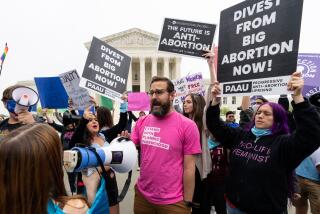Supreme Court rules church school has a right to tax funds for its playground
Reporting from Washington â The Supreme Court ruled Monday that a church-run preschool has a religious-freedom right to receive a tax-funded grant to improve its playground and may not be excluded from such aid on the grounds of church-state separation.
The courtâs 7-2 decision is an important, but modest victory for religious-rights advocates. It stops well short of saying that church schools have a right to public funds for teaching, for example.
Rather the justices decided the Missouri case by narrowly focusing on the fact that the preschool was turned down for a state grant for rubberizing its playground solely because it was run by a church.
The consequence may be only âa few extra scraped knees,â said Chief Justice John G. Roberts Jr., but denying the grant reflects an unconstitutional discrimination based on religion, he said.
âThe exclusion of Trinity Lutheran from a public benefit for which is it otherwise qualified, solely because it is a church, is odious to our Constitution all the same and cannot stand,â he wrote in Trinity Lutheran vs. Comer.
His opinion included a footnote that said the court was ruling on religious discrimination âwith respect to playground surfacing,â not to other forms of religious discrimination in public funding. That seemed to limit the rulingâs impact.
Justices Anthony M. Kennedy, Samuel A. Alito Jr. and Elena Kagan agreed entirely, while Justices Clarence Thomas and Neil M. Gorsuch agreed except for the footnote.
Justice Stephen Breyer also agreed with the outcome, but did not join either opinion. He said the government does not deny police and fire protection to churches, and the same applies to a âgeneral program designed to improve the health and safety of children.â
The courtâs two strongest liberals â Justices Sonia Sotomayor and Ruth Bader Ginsburg â dissented. Sotomayor faulted the court for holding âfor the first time, that the Constitution requires the government to provide funding directly to a church.â
Missouri had turned down the churchâs application for the playground grant by citing its state constitution, which forbids sending tax money to churches and church-run institutions.
Education Secretary Betsy DeVos said the decision âmarks a great day for the Constitution and sends a clear message that religious discrimination in any form cannot be tolerated in a society that values the 1st Amendment.â
But Holly Hollman, counsel for the Baptist Joint Committee, said the ruling âupends precedent and adds confusion to the law. The decision does not create a free exercise right to government funding of religion, but it unnecessarily blurs the line that ensures religion flourishes on its own.â
Daniel Mach, director of the ACLUâs Program on Freedom of Religion and Belief, called the decision disappointing but limited. âReligious freedom should protect unwilling taxpayers from funding church property, not force them to foot the bill,â he said.
Separately Monday, the court did not issue rulings on three pending cases involving immigration and the U.S. border.
In Hernandez vs. Mesa, the court in an unsigned opinion told the U.S. appeals court in New Orleans to take a second look at a border shooting case. The parents of a 15-year-old Mexican boy sued a U.S. border patrol agent who shot and killed the teenager when he was standing a few feet from the border on the Mexican side. The 5th Circuit had thrown out the parentsâ suit.
âThe facts alleged in the complaint depict a disturbing incident resulting in a heartbreaking loss of life,â the court said in sending the case back for a further hearing.
The court said it would rehear in the fall a Los Angeles case involving whether immigrants awaiting deportation can be jailed indefinitely, or instead have a right to a bond hearing after six months. The courtâs action suggests the eight justices were evenly split in Jennings vs. Rodriguez.
The court also said it will rehear the case of Sessions vs. Dimaya to decide whether noncitizens can be deported for an offense like breaking into an empty home because it may be deemed a âcrime of violence.â
On Twitter: DavidGSavage
UPDATES:
1:25 p.m.: This article was updated with details about other cases that the court did not decide.
This article was originally published at 12:25 p.m.
More to Read
Get the L.A. Times Politics newsletter
Deeply reported insights into legislation, politics and policy from Sacramento, Washington and beyond. In your inbox three times per week.
You may occasionally receive promotional content from the Los Angeles Times.











